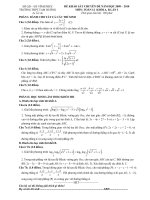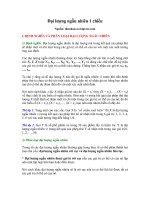tài liệu bd hsg 3 taøi lieäu luyeän thi tài liệu bd hsg 3 test 1 direction circle the word or phrase from a b c or d that is the best answer 1 what do you usually for delivering things a demand b
Bạn đang xem bản rút gọn của tài liệu. Xem và tải ngay bản đầy đủ của tài liệu tại đây (93.6 KB, 2 trang )
<span class='text_page_counter'>(1)</span><div class='page_container' data-page=1>
<b>TÀI LIỆU BD HSG 3</b>
TEST 1:
Direction: Circle the word or phrase from A, B, C, or D that is the best answer.
1. What do you usually _____ for delivering things?
A. demand B. charge C. cost D. price
2. What John says _____ true but I very much doubt it.
A. may be B. should be C. will be D. shall be
3. My uncle took _____ golf when he retired from work.
A. on B. up C. over D. after
4. Although this wine is quite cheap, it is very _____
A. drunk B. drinking C. drank D. drinkable
5. The farmer was very angry _____ the dogs chasing his sheep.
A. for B. with C. because D. about
6. While the builders were repairing the roof they _____ the bathroom window.
A. break B. broke C. have broken D. was broken
7. Without money you will be _____ to do anything about setting up your own business.
A. powerless B. underpowered C. powerful D. overpowered
8. The deer _____ for the shelter of the forest when there are people about.
A. go B. get C. make D. take
9. My parents got up very early this morning _____ pack the car for our journey
A. so that B. in order to C. because D. in case
10. After going for a long walk in the morning everyone ______ very hungry at lunchtime.
A. has B. was C. made D. got
11. Just as we were sitting down for the picnic it ______ began to rain.
A. soon B. suddenly C. at once D. in a moment
12. If no one ______ to the plan, we will start next week.
A. minds B. avoids C. objects D. argues
13. Children have to stay _____ school until they are 15.
A. with B. on C. to D. at
14. We very much ______ that you will come to dinner next Friday.
A. wish B. want C. like D. hope
15. There are three lawyers in our town and I have consulted _____ of them in turn.
A. each B. ever C. any D. other
16. Browns Ltd., will have to _____ sales during the coming year.
A. expand B. enlarge C. increase D. extend
17. Everyone in the department was _____ with the sack unless they worked harder.
A. promised B. warned C. bribed D. threatened
18. This morning’s history lesson seemed to go ______
A. through and through B. on and on C. over and over D. off and on
19. Why don’t you do something worthwhile with your time instead of just _____ it!
A. spending B. using C. wasting D. passing
20. The new factory chimney was _____ than all the trees around it.
A. longer B. greater C. deeper D. taller
21. It is over a year _____ I visited the dentist.
A. since B. past C. yet D. when
22. Far more people _____ football on a Saturday afternoon than play it.
A. watch B. look C. stare D. see
23. When I was a child I always wanted to _____ to play the piano.
A. know B. learn C. make D. discover
24. After a day of housework I am totally _____
A. weak B. dull C. strained D. exhausted
25. Please come round this evening; I _____ to see you urgently.
A. need B. beg C. long D. could
TEST 2:
Direction: Read these passages and then answer the questions below. Mark the correct letter A / B / C / D in the
following questions below.
Although speech is the most advanced form of communication, there are many ways of communicating without using
speech. Signals, signs, symbols and gestures may be found in every known culture. The basic function of a signal is to
impinge upon the environment in such a way that it attracts attention as for example the dote and dashes of a telegraph
circuit. Coded to refer to speech, the potential for communication is very great. Less adaptable to the codification of
words, signs also contain meaning in and of themselves. A stop sign or a barber pole conveys meaning quickly and
conveniently. Symbols are more difficult to describe than either signals or signs also because of their intricate
relationship with the receiver’s cultural perceptions. In some cultures, applauding in a theater provides performers with
an auditory symbol of approval. Gestures such as waving and handshaking also communicate certain cultural messages.
Although signals, signs, symbols and gestures are very useful, they do have a major disadvantage. They usually do
not allow ideas to be shared without the sender being directly adjacent to the receiver. As a result, means of
communication intended to be used for long distances and extended periods are based upon speech. Radio, television,
and the telephone are only a few.
1. Which of the following would be the best title for the passage?
A. Signs, Signals, and Symbols. B. Gestures
C. Communication. D. Speech
2. What does the author say about speech?
A. That it is the only true form of communication.
B. That it is dependent upon the advances made by inventors.
C. That it is necessary for communication to occur.
D. That it is the most advanced form of communication.
3. According to the passage what is a signal?
A. The most difficult form of communication to describe.
B. A form of communication which may be used across long distances.
C. A form of communication that interrupts the environment.
D. The form of communication most related to cultural perceptions.
4. Applauding was cited as an example of
A. a signal. B. a sign.
C. a symbol. D. a gesture.
5. Why were the, telephone, radio, and TV invented?
A. Because people were unable to understand signs, symbols, and signals.
B. Because people wanted to communicate across long distances.
C. Because people believed that signs, signals, and symbols were obsolete.
D. Because people wanted new forms of entertainment.
6. It may be concluded from this passage that
A. signals, signs, symbols, and gestures are forms of communication.
B. symbols are very easy to define and interpret.
C. only some cultures have signals, signs, and symbols.
D. waving and handshaking are not related to culture.
TEST 3:
Direction: Fill each of the numbered blanks in the following passage. Use only one word in each space.
During the trip, the fishermen told us that there were a lot of monkeys on a beach only a few miles (1)
_______________. We asked if they (2) _______________ take (3) _______________ there, and half an hour (4)
_______________, we arrived. The boat stopped some way from the beach so we had to (5) _______________ to the
shore. The monkeys did not seem to be afraid (6) _______________ us. So we assumed they (7) _______________ be
used to humans coming (8) _______________ see them.
I went off down the beach (9) _______________ my own. I came up to a tree in (10) _______________ there was
a much larger monkey, (11) _______________ the others, he didn’t seem to be at (12) _______________ friendly. His
mouth was diseased, and he bared his teeth aggressively. I was not quite sure (13) _______________ to do. Suddenly
the monkey leapt down (14) _______________ the tree, so I ran down the beach as fast as (15) _______________ with
the monkey at my heels . (16) _______________ the end I only managed to escaped (17) _______________ running
into the sea, (18) _______________ the monkey on the beach behind me.
The fishermen, (19) _______________ had seen all of this, were laughing (2) _______________ much that they
could hardly stand up.
TEST 5:
Direction: Finish each of the following sentences in such a way that it means exactly the same as the sentence printed
before it.
1. You can try to get Tim to lend you his car but you won’t succeed.
There’s no point ...
2. What a surprise to see you here!
Fancy ...
3. The only thing that kept us out of prison was the way he spoke the local dialect.
But for his command...
4. We couldn’t relax until all the guests had gone home.
Only...
5. I left without saying goodbye as I didn’t want to disturb the meeting.
Rather ...
6. Galileo is considered to be the father of modern astronomy.
Galileo is regarded ...
7. The last time it rained was a fortnight ago.
It ...
8. There is always trouble when he comes to visit us.
Whenever ...
9. The doctor advised me to rest.
</div>
<span class='text_page_counter'>(2)</span><div class='page_container' data-page=2>
10. The value of sterling has fallen considerably in the past week.
There has ...
TEST 6: Direction: supply the correct form of the word in parentheses.
1. The factory’s _______________ has increased considerably in the past few years. (PUT)
2. I was late for work this morning because my car had a ____________ on the motorway. (BREAK)
3. I’m afraid you’ll have to see Mr. Pound. All matters concerning finance are his _______________ (RESPOND)
4. But how could you do it? Really, Opheha. I feel quite ______________ of you! (SHAME)
5. There was a lot of _______________ this morning as work began on the new supermarket. (ACTIVE)
6. It is ______________ to take credit for other people’s ideas. (MORAL)
7. As the child’s head went under the water for the third time, I stood and watched-_______________ to help. I
couldn’t swim. (POWER)
8. I’d love to come to your party but, _______________, I have to go somewhere else. (FORTUNE)
9. Thousands of people turned up for the Pop Festival where the big _______________ was Bob Dylan. (ATTRACT)
10. There was a sudden _______________ of clapping and cheering as he rose to receive the Nobel Peace Prize.
(BURST)
TEST 7: Direction: Circle the word containing the sound that is different from other words’ sound.
1. A. hear B. clear C. tear D. bear
2. A. instead B. head C. weather D. seat
3. A. please B. nose C. dose D. house
4. A. main B. saint C. said D. laid
5. A. barn B. can't C. aunt D. dam
6. A. whose B. rose C. close D. chosen
7. A. bad B. sad C. glad D. same
8. A. how B. hour C. high D. hot
TEST 8:
supply the correct form of the verb in parentheses.
Dear Sir
I (be) (1) _______________ interested in the furnished cottage near Dedham which you (advertise)
(2) _______________ in yesterday’s Telegraph, for my husband and I (come) (3) _______________ to
England in June and (require) (4) _______________ accommodation for three months. You please (tell)
(5) _______________ me exactly where it (be) (6) _______________ and give me details of bus and
train services in the area? I also (like) (7) _______________ to know about the local shops. I (be able) (8)
_______________ to shop without a car? My husband (hope) (9) _______________ to hire a car, but I
(not drive) (10) _______________ and he (not be) (11) _______________ free very often to take me
shopping, so we (need) (12) _______________ a cottage on a bus route. The local shops still (deliver)
(13) _______________? I (know) _______________ they (do) (14) ______________ ten years ago.
I (be) (15) _______________ grateful also if you (tell) (16) _______________ me whether you supply
sheets etc. and whether a laundry (call) (16) _______________ at the house. The rent you (ask) (17)
_______________ (sound) (18) ____________ reasonable for the size of the cottage. How you (like) (19)
_______________ it paid? Weekly, monthly or in advance?
My husband and I (be) (20) _______________ abroad for ten years, but before that we (live) (21)
_______________ near Dedham, which is why we (want) (22) _______________ to spend our holidays
there. My husband also (write) (23) _______________ a book about Constable and (like) (24)
_______________ to finish it in the area where he, Constable, (paint) (25) _______________ most of his
pictures.
Mr Jones. the bank manager, (know) (26) _______________ us since we (live) (27)
_______________ in the area and I (be) (28) _______________ sure he (recommend) (29)
_______________ us as suitable tenants. I of course (be willing) (30) _______________ to send a
deposit.
I (be) (31) _______________ grateful for an early reply and (enclose) (32) _______________ a
stamped addressed envelop.
Yours faithfully,
Pamela Smith,
TEST 9 ENTERTAINMENT
Direction: Read the following passage and then choose A / B / C from (1) to (16) to complete the passage
“The Moon Trap” is a new film made by a young Canadian (1) _______________ called Melvin Strang. The main
parts in the film are (2) _______________ by Sid Cheung and Julie Plein who last appeared in “Music For Ever”.
In this new film (3) _______________ star as a young married couple who buy an old house in the country. After
living there (4) _______________ a few weeks strange things begin to happen.
Some of the furniture in the house disappears and can’t be (5) _______________ windows break and pictures fall
off walls. At night they (6) _______________ crying noises, and when the moon is up loud screams can be heard from
the woods nearby.
As you might expect, the young couple try to discover the (7) _______________ for all these strange events and
this leads them into some very frightening situations. (8) _______________ you are easily scared don’t go and see this
film! But if you enjoy films with (9) _______________ of adventure and murder (10) _______________ this is the film for
you.
1. A. actor B. leader C. director D. manager
2. A. played B. given C. made D. put
3. A. the B. they C. she D. them
4. A. since B. from C. for D. by
5. A. taken B. moved C. made D. found
6. A. hear B. make C. seem D. sound
7. A. way B. course C. reason D. use
8. A. Why B. If C. How D. Because
9. A. lots B. much C. many D. all
10. A. as B. when C. than D. then
TEST 10: Put in the correct prepositions or adverbs.
1.
You must carry _______________ the instructions on the packet exactly.
2.
After the music had died _______________, there was a storm of applause.
3.
The mob burnt _______________ several important buildings in the riots.
4.
The wearing of national costume has largely died _______________ in Europe.
5.
These children are very polite; they have obviously been well brought _______________
6.
She carried _______________ with her work in spite of all interruptions.
7.
You can stay _______________ till your father comes home and then you must go to bed.
8.
When the rebellion had died _______________ things quickly returned to normal.
9.
I’ll pick you _______________, at your office and take you straight to the station.
10. Several new records were set _______________ at the last Olympic Games.
11. He advises me to hang _______________
<i>(keep) </i>
those pictures as they will be valuable one day.
12. At the committee meeting the question of repairs to the roof was brought _______________.
TEST 11: Direction: Find and correct the following sentences.
1.
Neither of the two candidates
<b>who</b>
<b>had applied</b>
for admission
<b>to</b>
the Industrial Engineering
Department
<b>were</b>
eligible for scholarship.
2.
<b>Upon reading</b>
<i>Innocents Abroad</i>
<b>by</b>
Mark Twain, one begins to
<b>understand</b>
the value of
<b>your</b>
common sense.
3.
<b>Those</b>
of us
<b>who</b>
smoke should have
<b>their</b>
lungs X-rayed
<b>regularly</b>
.
4.
After the team of geologists had drawn diagrams in
<b>their</b>
notebooks and
<b>wrote</b>
explanations of the
formations
<b>which</b>
they had observed, they returned to their campsite to
<b>compare</b>
notes.
TEST 12 RROR ANALYSIS:
Direction: Find and correct the errors in the following.
Example: I dressed my clothes.
Correction: I got dressed.
1. I am interesting in his ideas.
2. How many peoples have you been invited to the party?
3. When I returned home, everything is quite. I walk to my room, get undress, and going to bed.
4. I didn’t go to dinner with them because I had already been eaten.
5. They did their homework so careful that I haven’t found any mistakes in it.
6. In class yesterday, I was confusing. I didn’t understand the lesson.
7. I couldn’t move. I was very frighten.
8. When we were children, we are very afraid of caterpillars. Whenever we saw one of these monsters, we run to our
house before the caterpillars could attack us. I am still scare when I saw a caterpillar close to me.
9. One day, while the old man was cutting down a big tree near the stream, his axe was fallen into the water. He sat
down and begin to cry because he does not have enough money to buy another axe.
</div>
<!--links-->









